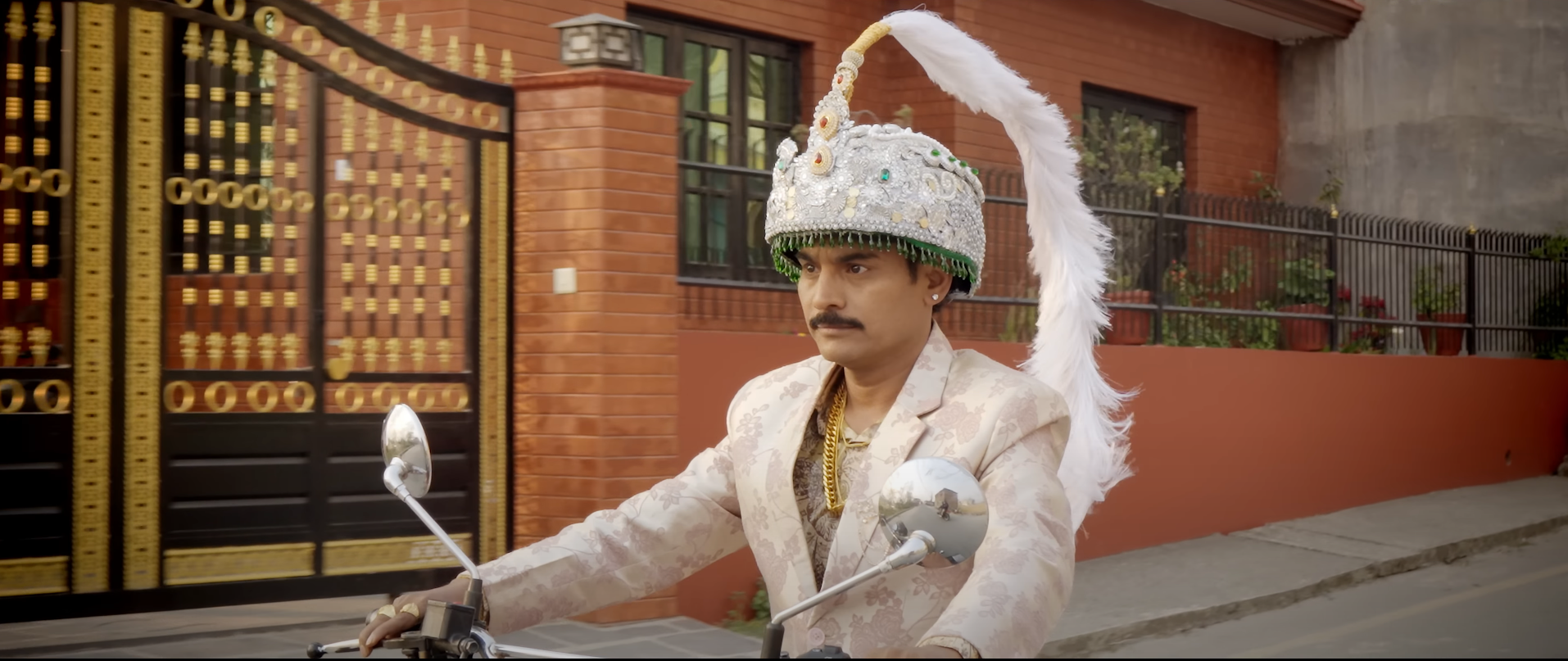

Director: Rishi Lamichhane
Producer: Munal Ghimire
Screenplay: Samipyaraj Timalsina
Cast: Kedar Ghimire, Barsha Siwakoti, Wilson Vikram Rai, Shishir Bangdel, Sharda Giri, Aryan Sigdel, and others
Music: Babul Giri and Deepak Sharma
Cinematography: Narendra Mainali
Editor: Mitra D Gurung
The review assesses the film across five categories, with scores given as follows: 1 = Weak, 2 = Average, 3 = Good, 4 = Very Good, and 5 = Excellent.
Story/Screenplay – Score 2.5
In Nepal’s 2022 local elections, the unexpected victories of independent candidates like Balendra Sah in Kathmandu and Hark Sampang in Dharan as mayors sent ripples through the political landscape. That same wave is now seeping into Nepali cinema, with films increasingly spotlighting federal structures and municipal leaders at the heart of their stories. Notable examples include Nango Gaun by Dipendra Lama, Dimaag Kharab by Nischal Basnet, and the upcoming Mayor, directed by Dipendra K. Khanal.
In Nango Gaun, the main character is an honest teacher who is forced to contest the rural municipality election. In Dimaag Kharab, a youth at the brink of leaving the country is compelled to run for municipal mayor. Similarly, in Magne, the protagonist Magant Narayan unexpectedly enters the mayoral race.
Magne Narayan’s story begins with a daydream in which he is distributing money, though in reality, he is hiding from creditors. By chance, he discovers a valuable C-mala in a pit while hiding, suddenly realizing his dream of becoming wealthy. The “beggar” now becomes the “king.”
In his journey from Magant Narayan to Kuver Sharma, he leaves his mother and village to move to the city. Once he becomes a neighbor to the city mayor, politics enters the film. A series of confrontations and conflicts unfolds between the mayor and Kuver, revolving around who will prevail—the mayor or Kuver.
After seeking justice, the mayor uses a bulldozer on Kuver’s house, files a case with the Property Recovery Department, and freezes his assets. What will Kuver do next? How will their conflict resolve? This is the central plot of the film.
The title, which revolves around money, is meaningful. The main character is poor as Magant Narayan and wealthy as Kuver Sharma. Similarly, Kuver’s assistant Barsha is named Shree and the mayor (Shishir) is named Dhanpati, reflecting intentional symbolism. However, in other aspects, the narrative cohesion is less evident.
The film has plenty of comedic dialogue and scenes, but character development and narrative tension are lacking. Repetition of Magne Budha’s humorous lines follows the same rhythm as the previous scenes.
The film dives into serious political issues without establishing the background for the conflict between Kuver and the mayor. After intermission, while touching lightly on cooperative victims, poverty, and corruption, the pacing falters.
The depiction of Magant Narayan, who grows up in a deprived village and suddenly becomes a social activist after seeing urban poverty, feels dominated by the writer rather than organically emerging from the character. By layering political themes over an entertaining story, the combination of plot, characters, and subplots is weakened, leaving the film as only light entertainment.
Acting – Score 2.5
The background of Magne Budha’s character is exaggerated, with Magne King as the pinnacle of this exaggeration. Kedar has ample opportunity to shine in both avatars, but his performance does not leave a lasting impression.
The relationship between Magant Narayan and his mother (Sharda) is well depicted but feels incomplete. Barsha’s performance as Kuver’s secretary is adequate but not a strong character. Similarly, Wilson as Mitbhanja is unclear in his motivations and relationship with Shree. Thus, apart from Magne King, most characters fail to remain memorable.
Shishir, portraying the mayor, is undoubtedly a strong actor, but he has played similar roles in Nango Gaun, leaving him typecast. Miss Pabi’s presence in the film is nominal, and Aryan Sigdel’s character is neither established nor significant.
Music – Score 2.5
The song about a man in debt who suddenly dreams of wealth fits the narrative well—Babul’s lyrics, composition, and vocals are enjoyable and relevant. Other songs in the film are ordinary.
Technical Aspects – Score 2
Cinematography in Kavre and Kathmandu is average. Some drone shots are well executed. However, inconsistencies in lighting and color between indoor and outdoor scenes are distracting. Background music occasionally overpowers the main characters, and editing leaves room for improvement in balancing comedic and serious scenes.
The colorful costumes for Kuver Sharma after becoming wealthy are commendable.
Direction – Score 2
Director Rishi’s work in presentation, sensitivity, and handling issues is average. Magne Budha is therefore more of an exaggerated character film than a showcase of directorial skill.
Dimaag Kharab faced criticism for allegedly favoring Balendra and the Rastriya Swatantra Party. Similarly, Magne King’s portrayal of the mayor as a villain does not overtly reflect any political ideology, though it raises questions.
Interestingly, the producer of this film is also the elected ward chairperson of Dang’s Ghorahi Sub-Metropolitan City, Ward No. 4, representing the Communist Party of Nepal (Unified Marxist–Leninist), CPN (UML).